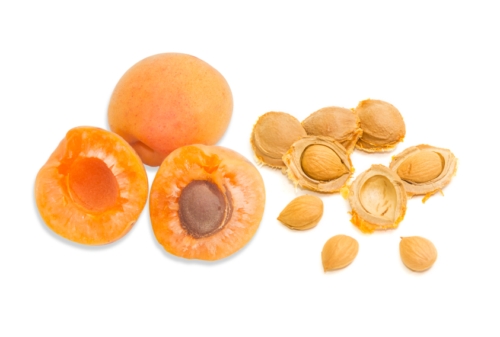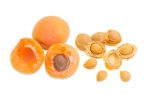
Although the kernels have been touted as a “superfood” due to their vitamin content, the EFSA report notes that consumers may be getting an extra bit of cyanide with their treats.
Strictly speaking, cyanide in fruit seeds is not a large revelation—it’s been known for some time that apple seeds contain cyanide, for instance.
The problem is that the amount of cyanide in apricot kernels, combined with the sheer volume of kernels people eat, can lead to potentially toxic levels. However, even a rigorous government report needs to be evaluated carefully just like any other form of study.
Apricot Kernels and Cyanide: Quick Stats
- Apricot kernels contain a substance called amygdalin, which gets converted to cyanide in the body
- Cyanide has an acute reference dose (the maximum acceptable level in a short period) of 20 micrograms (µg) per kilogram of body weight
- The average North American adult weights 80.7 kilograms. This puts the reference dose at around 1.6 milligrams of cyanide
- Cyanide is absorbed and distributed very quickly through the body, but it also doesn’t linger that long. Cyanide has a half life (time it takes for half of an amount to be expelled) of around an hour
- Toxicity can cause nausea, fever, headache, insomnia, excessive thirst, joint and muscle pain, anxiety and nervousness, and low blood pressure. In high enough doses it can also be lethal and is a popular poison in older crime fiction
EFSA Report: Summary
- The report is an attempt to resolve differences in findings between several EU bodies about the issue of cyanide from apricot kernels
- The highest known concentration of cyanide in apricot kernels is about 3.8 milligrams per gram of kernel
- According to a 12-person study done by the EFSA and a review of literature, the reference dose for a toddler would be exceeded by a single kernel and in adults, this would take only three small kernels. Less than half of a large kernel could also cause an adult to exceed the reference dose. This assumes the kernels have the highest known cyanide levels
- Although the EU groups differ in how reliable they find the data, all agree that two apricot kernels per adult per day is a safe recommendation
- The report concludes by noting that toxicity cases have happened in adults who ate as few as 20 kernels and in children who ate as few as five.
Issues With the Findings
The amount of apricot kernels that gets promoted to consumers is up to 10 per day for normal adults and 60 for cancer patients. Based on these numbers and the report findings, one would expect to see a lot more cases of cyanide poisoning—a fact not lost on one of the agencies involved.
The issue is that with something like cyanide, which doesn’t last long in the body, there are a lot of variables that can affect how much someone can safely ingest. Personal sensitivities, size of the kernel, amount of amygdalin in the kernel, and other factors can all affect how safe or dangerous any given amount is.
The EFSA does acknowledge this and notes that there is a point in the calculations where “uncertainty factors” are used. This is an extra form of number crunching that happens sometimes in toxicology. It is basically a form of calculated estimation used to help err on the side of caution in the face of unknown factors.
What This All Means
It’s possible to dismiss the report as exaggerating the risks or overestimating the possible danger, but to do so would oversimplify matters. The report notes that there is no readily reliable way for consumers to tell how much amygdalin is in an apricot kernel or whether a kernel falls into the small, medium, or large sizes, especially if it has been made into something like a jam.
While the two kernel per day limit may be overly cautious, it is the result of acknowledging how different factors can affect individual consumers’ vulnerability and making the safest and most broadly-applicable conclusion as a result while still acknowledging the imperfections that can be refined in the future.
Bottom Line
- It’s probably best not to give apricot kernels to small children to err on the side of caution
- Adults who still want to eat more than two kernels per day should space them out at least an hour apart
- If you are going to poison someone, please use something less cliché
Related:
Sources:
“Acute health risks related to the presence of cyanogenic glycosides in raw apricot kernels and products derived from raw apricot kernels,” EFSA Journal, 2016; 10.2903/j.efsa.2016.4424
“Acute health risks related to consumption of raw apricot kernels and products thereof,” EFSA web site, April, 2016; https://www.efsa.europa.eu/sites/default/files/4424ax1.pdf, last accessed April 28, 2016.













